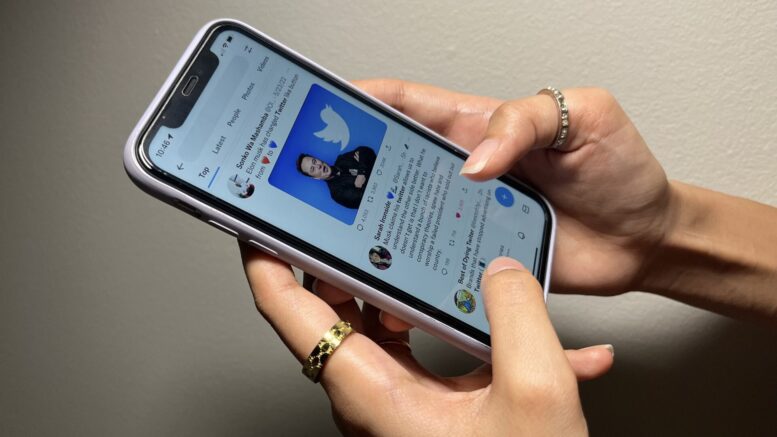Twitter has elicited headline after headline since Elon Musk acquired it in October 2022, but journalists say they’re unsure of their future on the social-media platform.
The changes under Musk’s ownership may “make an already unfriendly place downright miserable for journalists,” said Shauna Rempel, a social-media strategist and journalism instructor in Toronto.
Rempel believes journalists will have to change their workflow and think twice before quoting tweets because accounts might be fake.
“This is [Musk’s] typical pattern,” said Jeffrey Dvorkin, a retired Canadian-American journalist and journalism professor. “He will get engaged in a business of some sort and then disrupt it to the point that his purpose seems obscure and unpredictable.”
Musk has enacted many changes within the company since his takeover Oct. 27, 2022, causing the company’s stock to drop. He laid off nearly half of the company’s staff — breaching employment contracts — with resignations and layoffs continuing into 2023. He told remaining employees they had to adapt to the changes and become “hardcore,” or resign, the Washington Post reported.
Musk rolled out a subscription model for the highly-sought blue verification mark which labelled accounts as notable, authentic and active, before pausing the strategy; fake accounts began impersonating high-profile brands and companies, causing the companies’ stocks to lose value.
He also reinstated previously suspended accounts, such as Donald Trump and Andrew Tate’s, in the name of freedom of speech.
In December, he suspended the accounts of a group journalists who regularly covered Musk, and who had published details about his suspension of a Twitter account, @elonjet, which shared publicly available data on Musk’s private jet’s flight paths.
The move was met with sharp criticism, and Musk reinstated the journalists’ accounts a day later.
Before Musk’s acquisition, Twitter was considered a news-friendly platform where users could go to find out what was happening in the world, and various views on these matters.
Professional journalists, such as Rempel, also used the platform to network, find ideas and perspectives, share content or just keep up with the news.
However, under Musk’s leadership, many believe the reliability of information on Twitter has decreased. Musk has loosened the controls of who can post on Twitter and what can be posted, “allowing people to spread fake news,” said Richard Powers, former associate dean at Rotman School of Management in Toronto.
Misinformation will continue to increase: Powers
In January, Musk laid off a dozen employees who worked on the global content moderation, misinformation and hate and harassment teams, according to Bloomberg. Those teams had already undergone massive reductions in the initial November 2022 layoffs, just days ahead of the U.S. mid-term elections.
Powers believes misinformation will continue to increase on Twitter with Musk in charge. “Journalists and other media personalities will have to decide whether they’re going to continue using Twitter,” Powers said. “Or will other platforms take its place?”
Musk’s actions will likely lead to a general distrust in news on Twitter, said Rempel. The unreliability of the information on Twitter will make it crucial for all users to employ critical thinking whenever they are navigating the platform.
Now on Twitter: More hate speech
Musk’s attempts to improve freedom of speech have also led to a rise in hate speech on Twitter, according to an analysis by Tufts University. “On one hand, we have freedom of expression,” Powers said. “But on the other hand, we have societal rules and laws that try to contain behaviour that goes against other people’s rights.”
It is necessary to balance freedom of speech with the censorship of false and hateful content, Dvorkin, Rempel and Powers all believe. “There are laws against hate speech and there should be rules on social media,” Rempel said.
Dvorkin said Musk has created more distrust in Twitter than ever before. Those consuming news and information on the platform will now continuously have to ask themselves, “How do we know for sure? Where did this come from? How can we verify the source?”
Musk announced in November 2022 that he would find a new CEO for Twitter, but thus far, has not named his replacement, or stepped down.
With files from Lisa Yeung

